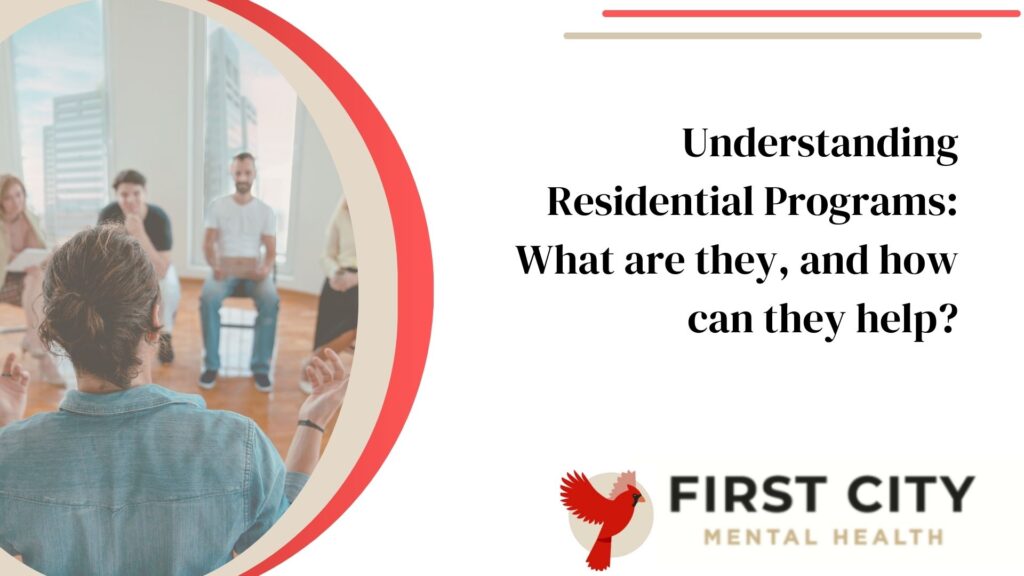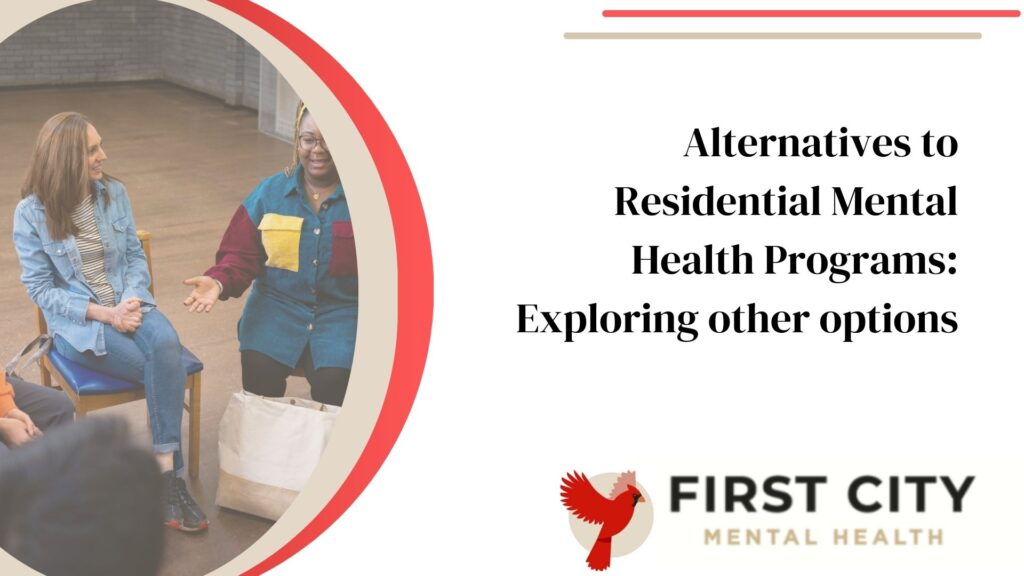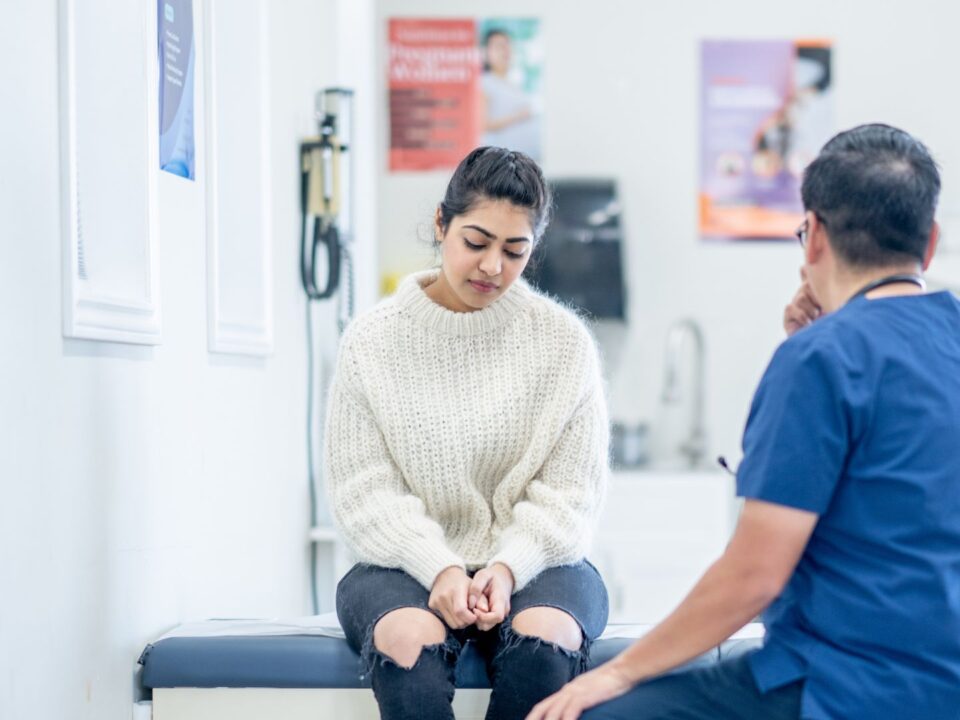
What Are The Benefits of Adult Intensive Outpatient Program in Indianapolis?
January 15, 2025
How Does Inpatient Mental Health Treatment Works in Indianapolis?
January 15, 2025When life feels overwhelming and the path to recovery seems unclear, finding the right support for residential mental health program can make all the difference. At First City Mental Health Center, we understand that navigating your options after a stabilization period is not just about choosing a program—it’s about embarking on a journey toward renewed hope and healing.
Whether you’re grappling with addiction, anxiety, depression, or other mental health challenges, our residential programs are designed to provide personalized care tailored to your unique needs.
In this blog post, we’ll explore how to effectively assess your choices and identify which program best aligns with your goals. Join us as we illuminate what awaits you at First City Mental Health Center, a place where compassionate care meets transformative growth.
Key Takeaways:
- The Importance of Post-Stabilization Care
Recovery doesn’t end with stabilization; it requires continuous care to address underlying issues and establish long-term wellness. Programs like those at First City Mental Health Center bridge the gap between crisis management and sustainable healing. - Tailored Residential Treatment Options
Residential programs at First City Mental Health Center cater to diverse needs, from intensive therapy to transitional housing. These options provide a structured and supportive environment for individuals and their families to foster growth and recovery. - Exploring Alternatives to Residential Programs
For those seeking flexibility, options such as outpatient programs, intensive outpatient programs (IOPs), and holistic therapies can be effective alternatives, offering tailored support outside of a residential setting.
Why Finding the Right Residential Program at First City Mental Health Center is Crucial After Stabilization.
Finding the right path to recovery can feel overwhelming. After stabilization, many individuals face a crucial decision: how to continue their journey toward wellness in Residential Mental Health. For many people in Indianapolis, the largest metropolitan city just 45 minutes north of Kokomo, they find few stabilization programs that offer the full continuum of care. Usually, these programs are 7-10 days of stabilization with no continual step-down or proper residential treatment program.
We serve many patients from all over Indiana, especially Indianapolis. Not only do we offer all levels of care, including inpatient and outpatient, for both addictive disorders and mental health disorders, but we also offer a safe place away from the usual “people, places, and things.”
Being in a very large and dense city can bring about unwanted temptations and easier access to drugs. Our residential mental health programs and addiction treatment center in Kokomo offers a respite for treatment with peace and safety.
At First City Mental Health Center, understanding your options for residential programs is essential. These programs are designed not just to provide support but also to help you build a foundation for long-term healing and growth. With various choices available, knowing where to start can make all the difference in achieving lasting success on your road to recovery.
Understanding Residential Programs: What are they, and how can they help?

Residential mental health treatment and programs are structured environments designed to support individuals facing mental health challenges. They provide a safe space for recovery, focusing on emotional well-being and stability.
These programs often combine therapy, medication management, and group activities. Participants can engage in various therapeutic modalities tailored to their needs. This holistic approach fosters healing by addressing both psychological and social aspects of mental health.
The immersive nature of residential programs allows individuals to step away from daily stresses. This break helps them focus entirely on their recovery journey. Daily routines within these settings often include individual counseling sessions, skill-building workshops, and peer support groups.
By creating a community atmosphere, participants develop connections with others who understand their struggles. This camaraderie can be instrumental in building resilience and promoting long-term recovery strategies at the First City Mental Health Center.
The Importance of Post-Stabilization Care: Why seeking help after stabilization is important for long-term recovery.
After stabilization, many individuals may feel a false sense of security. The immediate crisis has subsided, but the underlying issues often remain.
Post-stabilization care plays a crucial role in addressing these factors. It helps to bridge the gap between emergency treatment and long-term wellness strategies for residential mental health.
This phase allows for continued support through therapy and group sessions. Patients can explore coping mechanisms that are essential for managing their mental health challenges effectively.
Moreover, engaging with professionals aids in identifying triggers before they escalate into crises again. Establishing routine follow-ups fosters accountability and maintains focus on recovery goals.
The journey towards healing doesn’t end with stabilization; it evolves with continuous care. Each step taken post-crisis strengthens resilience and builds a healthier future.
Types of Residential Programs at First City Mental Health Center: Exploring the Available Options.

At First City Mental Health Center, a variety of residential treatment for mental health cater to diverse needs. Each program is tailored to support individuals on their journey toward wellness.
One option is the intensive treatment program. This setting offers structured therapy sessions that focus on mental health stabilization and skill-building. Participants engage in group discussions and individual counseling, fostering a sense of community.
Another choice is transitional housing. This helps individuals prepare for life outside the center while still receiving support. It’s ideal for those who need time to adjust after initial treatment but aren’t ready for full independence yet.
Specialized programs for families involve loved ones in therapy activities. These programs strengthen bonds and equip families with tools to create supportive home environments.
How to Get the Most out of Your Time in a Residential Mental Health Program?
Engaging fully in your residential mental health facility program can be transformative. Start by setting personal goals. Knowing what you want to achieve creates focus.
Be open to new experiences and learning opportunities. Embrace the various therapeutic activities offered, whether they are group sessions or individual counseling.
Building connections with peers is essential. Sharing your journey with others fosters support and understanding that can enhance your recovery process.
Maintain a positive mindset throughout your stay at Residential Mental Health. Challenges may arise, but viewing them as growth opportunities can make a significant difference.
Lastly, actively participate in feedback sessions. Your input helps shape the program’s effectiveness and ensures it meets your needs better.
Alternatives to Residential Mental Health Programs: Exploring other options

When considering mental health residential treatment care options, residential programs are just one path. For some individuals, outpatient therapy may be a more suitable choice. This allows for flexibility while still providing essential support and guidance.
Support groups can also play a significant role in recovery. They offer community and understanding from others who have faced similar challenges. Engaging with peers can foster connections that encourage healing.
Another option is intensive outpatient programs (IOPs), which provide structured treatment without the need for overnight stays in Residential Mental Health. These programs often combine therapy sessions with life skills training to ensure comprehensive support. At First City Mental Health Center, we offer IOP with schedules that work for those who have a professional and family life.
Exploring holistic treatments might also be beneficial. Yoga, meditation, and art therapy are examples of alternatives that promote wellness in unique ways.
Ultimately, finding what works best requires careful consideration of individual needs and circumstances. Each person’s journey is distinct; therefore, exploring various options ensures you choose the most fitting path toward recovery at First City Mental Health Center or beyond.
Conclusion
Choosing the right path after stabilization is crucial for long-term recovery for Residential Mental Health. Whether through residential care or alternative options, First City Mental Health Center provides a supportive environment to guide individuals toward hope, healing, and lasting transformation. Your journey is unique, and the right care can make all the difference in achieving a fulfilling and healthy life.






